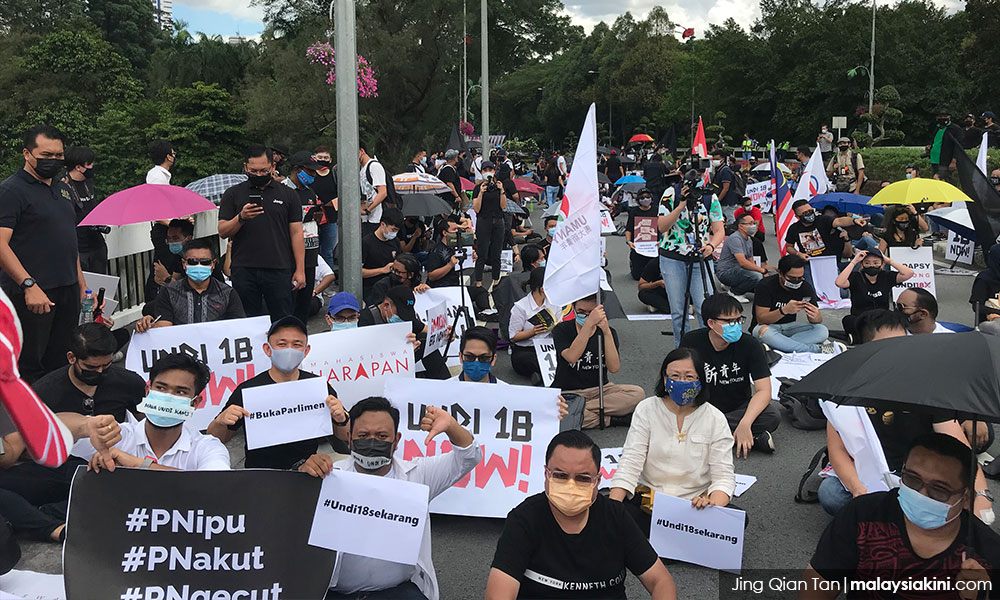Youth turnout may be a determining factor in the electoral results for the Johor 2022 state election - and I, for one, am excited to see just what sort of impact we make.
To understand this, it is important to make a comparison with the recent state elections in Sabah, Malacca and Sarawak that took place in 2020 and 2021.
Undi18 had yet to be implemented, and younger voters' participation was limited. Personally, issues such as loss of jobs, wage security, lack of housing affordability, and others that are more pertinent to youths, were not prioritised.
These issues make the young in Malaysia feel neglected.
The Election Commission (EC) of Malaysia has predicted that the voter turnout for Johor 2022 state election will be 70 percent.
In comparison with the past three state elections in Sabah, Malacca and Sarawak, the turnouts have shown to be lower than what was predicted by the EC: Sabah (66.61 percent), Malacca (65.85 percent)and Sarawak (60.67 percent).
Notwithstanding the nuances of geographical, social and economic attributes, voters have slowly become disillusioned and dissatisfied with the politicians' efforts, or lack thereof, in representing their constituencies (either state or parliamentary constituencies).
Looking at the Covid-19 climate and past political crises since 2020, we can see how voters spoke up about their disappointment towards politicians and their general management on all existing and future crises.
In fact, the reputation of political leaders has never been lower, as can be seen with recent flooding across different states, impacts of the pandemic towards businesses and employment, political mismanagement and various others.
Need for constant pressure for youths to be noticed
Although the Johor 2022 state election will be the first to experience youth voters under 21 years old, youth empowerment through the Undi18 implementation is so much more than that.
With an increase of 150,000 new youth voters between the ages of 18 to 21 years old in Johor, we will see a surge of youths partaking in democratic processes and being a part of nation-building at an earlier age.
This is important to me because I have continuously advocated for political and social justice in Malaysia through self-involvement in multiple youth-led organisations.

Seeing the delay in the Undi18 implementation was devastating.
I echo the sentiments of the youths who represented the movement and challenged the government into putting the bill into effect without any further delay.
To slowly see our effort being actualised provides a sense of importance to our voice being heard and our status being positioned in Malaysian democracy.
This is even though there may be a need for constant pressure against the government and the opposition to take notice of us.
With the total number of registered voters across Johor being around 2.59 million, I will not predict that a higher number of voters will equate to a higher turnout.
I agree that the youth voting trend could still be considered sporadic and unpredictable.
However, with more transparency in youth's representation in politics and their participation to be included, younger voters are getting eager to fulfil their civic duty.
A cycle of empowerment for youth
As a first time voter myself, it can be daunting to bear this responsibility.
The way that I see it, however, is that we are more than the future leaders of tomorrow. We are the constant catalyst of today's development in society.
That being said, it is important for us to consider the promises and actions of current and new politicians that represent their respective constituencies.
There are a lot more younger politicians that have shown their capabilities and credibility where other youths can mirror; a constant cycle of empowerment.
For example, during the flood outbreak, youths from Muda, Umno, PKR and other political parties provided aid and assistance by bringing together volunteers and doing on-the-ground work, setting up donations and handling crises.
Through this, we are able to trust politicians, be more involved in politics and are more inclined in voting for those who have shown continuous effort compared to others.

The Muda party, being registered as a party under the leadership of Syed Saddiq Syed Abdul Rahman, who has fought for Malaysian youths on multiple occasions, showcases that no matter how young the youths are, we are willing to fight for the greater good of the nation.
The main concern, however, is that voters of older ages may have the same sentiment, but with them having more experience and exposure in past politics may hinder them from putting their full trust in any parties.
This also goes for voters of minority backgrounds. It is natural for them to contemplate if they should be voting based on the candidate or the party the candidate represents.
Furthermore, most political parties contesting in the Johor state elections endeavour to ensure that youth issues are tackled and managed, albeit that may only be election strategies and campaigning methods.
Nonetheless, following the trends in the Malaysian political sphere and building on larger youths' participation can maximise their effort in gaining more supporters.
Whether those who win later go on to serve the people and represent their constituencies effectively, only the future will tell.
Although it is uncertain that young voters' turnout will be the determinant, it is still going to be a refreshing sight to see. I, for one, welcome it wholeheartedly. - Mkini
UNGKU ‘ARIFIN is a youth social and political advocate.
The views expressed here are those of the author/contributor and do not necessarily represent the views of MMKtT.




No comments:
Post a Comment
Note: Only a member of this blog may post a comment.